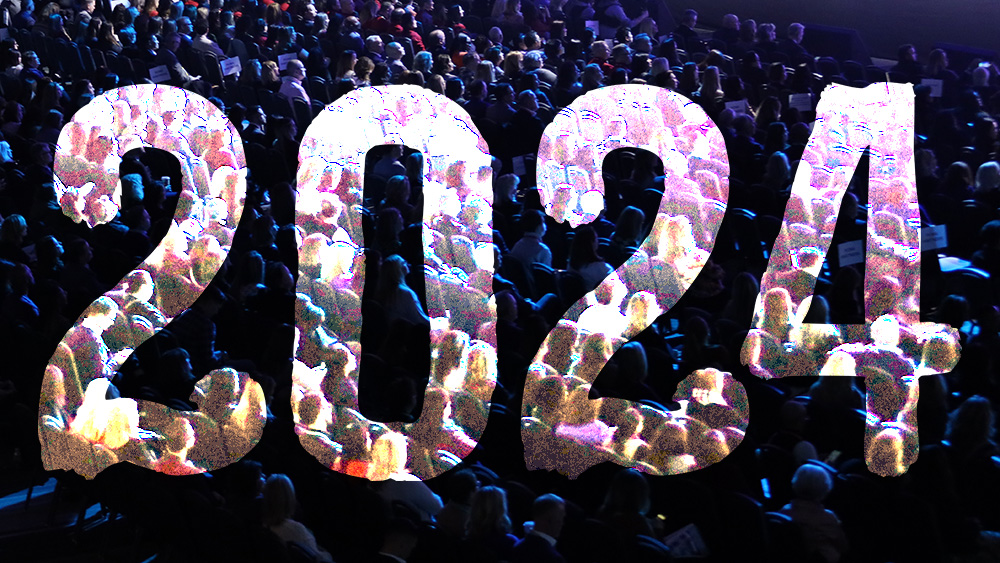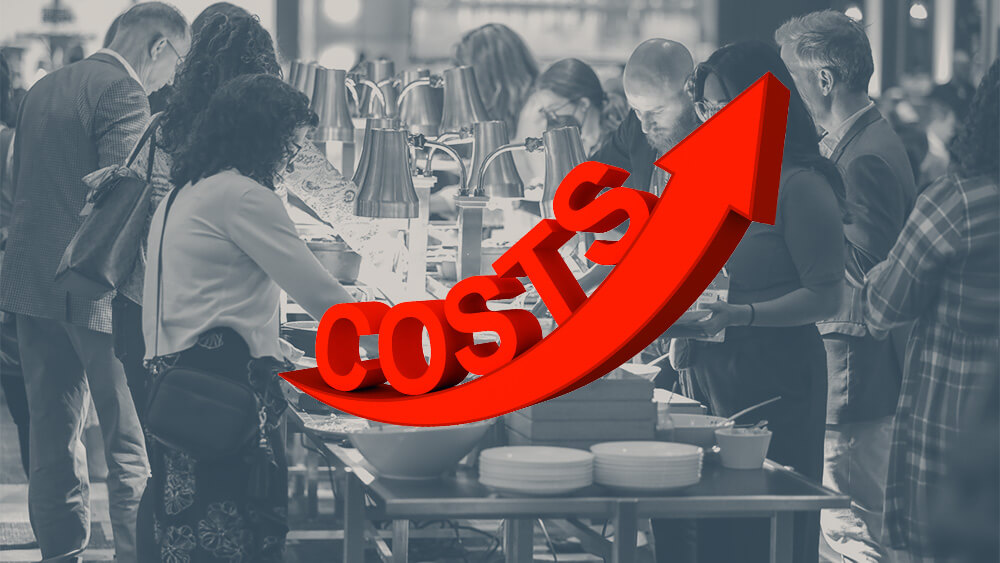
The Promise of AI for Events
Large language models like ChatGPT continue to dominate the discussion about artificial intelligence because generative AI — which can generate new content, including text, images, and music — is a relatively new tech development. But AI has been behind event-tech tool innovation for much longer.

Shawn Cheng
The companies participating in the Tech Playground at Convening Leaders 2024 in January are introducing creative solutions for event organizers powered by AI. Examples include wearable tech capable of capturing real-time data that promises to revolutionize how organizers gather insights into attendee behavior, software solutions that automate various aspects of event planning and thus increase planner efficiency, and a service that offers web-based augmented reality activations. These tools will streamline organizer’ work and open new possibilities for immersive and engaging event experiences, said Shawn Cheng, event strategist at Curious Bear Management and one of the Playground’s organizers.
The industry as a whole is adopting AI as a way to streamline event professionals’ everyday work for organizational efficiency and to enhance participants’ overall experience. “Leading event organizers are trialing an extraordinary array of powerful applications,” Ross Dawson, the founding chairman of Sydney-based Advanced Human Technologies Group, said in Convene’s Events Industry Forecast. These include live session summaries, intelligent attendee matching, customized event pathways, and AI-powered insight generation for delegates, Dawson said.
Advances in AI also are fueling other event movements such as sustainability, the personalization of events, and gamification. It is super-charging mobile event apps too, improving attendee registration, data capture, venue booking, and overall event management.
In 2024, AI’s impact will be felt in the widespread adoption of gen AI, as well as other forms of artificial intelligence, influencing how events are conceptualized, planned, and experienced. — Curt Wagner, digital editor
Trust Takes Center Stage
I’ve been torn between writing about two trends — the ongoing story about how generative AI is transforming events and the increasingly critical role that trust will play in the future.

If an event organizer using an AI chatbot can “give you value in the form of instant answers or information, [it] builds trust,” said Chuck Elias, CEO of 42Chat.
Trust, Elias told me, is the foundation of everything the company does. In order to be engaged, he said, users must be confident that information they receive is accurate, and that 42Chat will use their data with integrity. When IBM’s Institute for Business Value released a “5 Trends for 2024” report, it also noted the fundamental need for trust amid technological change. As the pace, depth, and breadth of technology surges in the age of AI, the report said, all five tech trends “hinge on trust” — that means trust in the technology itself internally within organizations and establishing trust externally among consumers. “In a world where nuances of human judgment counterbalance and complement deep technology,” the report said, “trust has become the new business currency.”
I predict we will be talking a lot more about transparency and ethics in our practices around the use of data and AI in 2024 and asking more questions of event participants and other stakeholders about what it will take to earn and maintain their trust. — Barbara Palmer, deputy editor
Social Media Shifts
The trend I’m keeping my eye on in 2024 is social media. The irony of this is not lost on me. I am likely one of the least active people in the world on social media — I get its value, but it’s a place where I’ve deliberately chosen not to spend a lot of my time.

Dan Lyons
I’ve long felt my lack of engagement with social media was a detriment, one of my failings. But Dan Lyons, author of STFU: The Power of Keeping your Mouth Shut in an Endlessly Noisy World has made me feel better about this. His advice: You should quit social media, or at least dial it way back for your mental health. “Social media companies use a business model that depends on keeping you online for as long as possible,” he writes. “To make the most money, they need to keep you ‘engaged,’ which means instead of just reading, they need you to be posting, tweeting, sharing, and liking, and they’ve found that the best way to do that is to make you angry. … Another problem is that it’s really hard to break free from social media because the apps are designed to be addictive. These apps give you little jolts of dopamine, a feel-good hormone. You start to crave that dopamine, and so you keep going back.”
How does this relate back to the business events industry? I think the reckoning with social media has begun. It’s not that I’m suggesting that everyone will wean themselves off social media, but maybe active users will engage less in such a noisy environment — especially if they come to the realization that it isn’t contributing to their wellbeing.
That aside, we do know its applications for business are shifting. As Deputy Editor Barbara Palmer recently wrote, there’s already been a massive movement toward using LinkedIn over Facebook and Twitter — evidenced in our own industry by the results of Convene’s latest Meetings Market Survey. LinkedIn was the most popular social media channel — used by three out of five event organizer respondents — to promote events. Just three years ago, Facebook was the leading channel for event promotion.
And Twitter, now X, has lost 13 percent of its daily active users since Elon Musk bought the company in late 2022.

Stephen Rose
In addition, businesses may become choosier about which platforms to invest in. A recent Hootsuite Social Trends 2024 report found that organizations are concerned about the ROI impact of being on so many platforms, with more than half stating that the time or budget investment to maintain a presence on multiple social platforms is an issue. More than one-third said they were uncertain about the accuracy of campaign success metrics and another third are unsatisfied with the connection between social metrics and business metrics.
But the biggest disruption will be from — no surprise here — gen AI. As Stephen Rose, senior vice president and head of global communication services at Siemens, told Digital Media Editor Magdalina Atanassova on a recent Convene podcast, AI may spell the end of “social” in social media. “Because if you can create content via AI — and I’m sure we’re only a very short time away from a plug-in for LinkedIn that will help you to also comment and like certain articles — then it’s just a system that revolves itself all the time,” he said. So, if “the content is created by a machine, the comments are created by a machine, I’d be a lot faster. I could comment on 500 posts this morning before I go to breakfast because I have an AI tool to do that — but that means that the relevance of the content will decline. And the social and personal human touch — they’ll be gone. At least of pure written social media.”
Which, he said, could lead to the resurgence of TikTok and Instagram “because at least there you have the feeling” that there’s a real person behind the posts.
If Rose is right, LinkedIn’s growth spurt may sputter out. It will be interesting to see how the landscape shifts, even for this social-media-estranged observer. — Michelle Russell, editor in chief
 Refiguring Security at Events
Refiguring Security at Events
It’s an impossible trend to miss when you read the news — public behavior has grown more aggressive and disruptive in the wake of the pandemic. Social and political division continues to become more pronounced in our society — perhaps by our social media algorithms’ design — and it has resulted in dangerous behavior in all sorts of settings: The International Air Transport Association saw a nearly 50-percent increase in unruly airline passenger incidents between 2021 and 2022, while a number of celebrities have had objects thrown at them in the past year at public events — most recently, actor Florence Pugh was struck in the eye by an object while on stage in Brazil promoting “Dune: Part Two.”
The shifting security needs of events is apparent, which is why Convene focused its September/October 2023 cover story on how planners and venues are handling safety protocols while this breakdown of societal norms takes place.
“Let’s just face it: We cannot, at any time of our day, stop from seeing something happening around the world that is a reminder of the type of environment and culture we live in right now,” said Samuel Thomas Jr., senior vice president and general manager of McCormick Place campus, with Oak View Group (OVG360) in the cover story. Planners and venues will need to continue working together to strike a balance between ensuring attendees’ safety without an anxiety-inducing security presence — including the increased use of technology for weapon detection and facial recognition. — Casey Gale, managing editor

Rising event costs — which challenge planners to do more with less — could become the new normal and not a trend at all.
Doing More with Less
In Convene’s annual Events Industry Forecast published in the November 2023 issue, budgetary woes ranked as one of survey-takers’ most commonly identified challenges — specifically, dealing with “insufficient budgets and financial resources while expenses continue to rise.” So, it may not come as a shock that one of the biggest industry trends forecasted for 2024 is simply just doing more with less.
Recent data shared by Maritz Global Events at IMEX America in October 2023 showed that the majority of costs across the entire supply chain have increased 20 to 30 percent and beyond compared to 2019. Said Mary Casey, Maritz’s Chief Client Officer: “while high costs are straining budgets, we’re not seeing changes to those budgets — we’re seeing clients live within them.”
According to the CWT GBTA Travel Price Forecast 2024 — which focuses specifically on hotel room rates, air and ground transport pricing, and meetings and events — the average cost per attendee per day will continue to rise in 2024 to $174, along with the average cost for F&B per attendee rising to $190, and ADR for group hotel bookings jumping to $321. Demand will continue to rise right along with those prices, as “trips [for meetings and events] have become longer, more frequent, and now often have more participants,” said the CWT forecast.
This trend may also shake out to be not a trend at all, but the new normal for event professionals. “Astounding price rises, defying most predictions, are now the norm,” the CWT forecast states. “Elevated costs look set to stay with us in the year ahead, but with muted increases going forward. This new era could reflect today’s true cost of business travel. However, these changing industry dynamics offer a potentially generational opportunity to shift expectations in terms of how much it should cost to travel for business and how the industry should address this shift.” — Jennifer N. Dienst, senior editor
Imagining the Future of Work
In last year’s trends analysis, we underscored the impact of the great resignation and the mounting pressure on employers to reinvent work cultures and environments in 2023. However, event professionals’ responses to our Salary Survey, recently published in our December issue, indicate that the industry has yet to catch up with the global transformation Deloitte refers to as the shift “from great resignation to great reimagination.”
 The workplaces may have pivoted to a more flexible format for nine out of 10 event professionals responding to our Salary Survey, but work cultures and job roles have not been reimagined, with half of respondents working between 41-50 hours per week, and nearly half having additional duties added to their job description. One respondent who said they are “juggling increased responsibilities due to staff reduction (all at the same salary!)” voiced how event professionals are now expected to accomplish more with less.
The workplaces may have pivoted to a more flexible format for nine out of 10 event professionals responding to our Salary Survey, but work cultures and job roles have not been reimagined, with half of respondents working between 41-50 hours per week, and nearly half having additional duties added to their job description. One respondent who said they are “juggling increased responsibilities due to staff reduction (all at the same salary!)” voiced how event professionals are now expected to accomplish more with less.
The business events industry continues to grapple with the loss of workers who left during the pandemic and have yet to be replaced, meaning that operating the same way as before COVID simply isn’t possible. As one respondent to our Meetings Market Survey put it, “I enjoy the work and the people I work with. But the work has gotten very difficult. Hotels and suppliers are non-responsive, understaffed, and offering poor-quality work.”
Some of the discussions that I had this year with event professionals showed the way forward: a new leadership model and greater empathy is required. These are the foundations on which events industry organizations can begin to “cocreate the relationship” with their workers, as Deloitte explored in its 2023 Global Human Capital Trends. “Organizations and workers will need to learn to navigate this new world together — cocreating new rules, new boundaries, and a new relationship,” the authors wrote.
There is no time to wait for another external event, such as COVID, to shake up our industry and bring it in line with the rest of the world. I think that organizations that start implementing these changes now will not only help the industry move forward stronger than ever, but will also enhance the professional satisfaction among their teams, in turn elevating their contributions to their events. — Magdalina Atanassova, digital media editor
